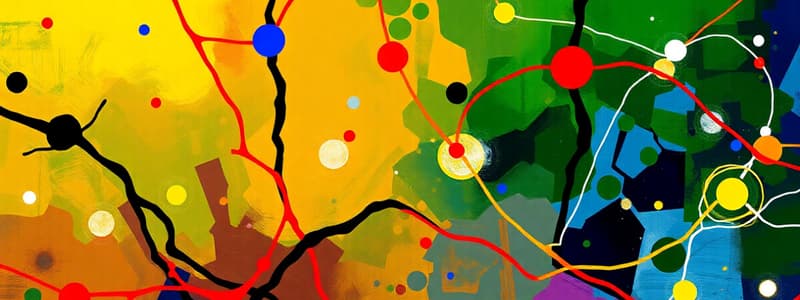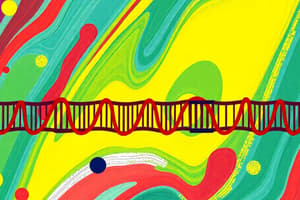Podcast
Questions and Answers
What characterizes graded potentials in neurons?
What characterizes graded potentials in neurons?
- They involve voltage-gated channels.
- They require a threshold potential to occur.
- They can vary in size and fade over distance. (correct)
- They are restricted to action potentials only.
Which of the following statements about graded potentials is true?
Which of the following statements about graded potentials is true?
- They occur only in axons.
- They have an absolute refractory period.
- They always cause action potentials.
- They can sum algebraically. (correct)
What causes hyperpolarization in a neuron?
What causes hyperpolarization in a neuron?
- Efflux of K+ ions only.
- Influx of Na+ ions.
- Influx of Cl- ions bringing excess negative charge. (correct)
- Depolarization from stimuli.
What potential must be reached for an action potential to be generated?
What potential must be reached for an action potential to be generated?
Which of the following best describes the passive conduction of graded potentials?
Which of the following best describes the passive conduction of graded potentials?
When multiple stimuli are too far apart, what happens?
When multiple stimuli are too far apart, what happens?
What is primarily responsible for the generation of action potentials?
What is primarily responsible for the generation of action potentials?
What happens to ion permeability when the threshold is reached?
What happens to ion permeability when the threshold is reached?
What is the primary function of leakage channels in neuronal membranes?
What is the primary function of leakage channels in neuronal membranes?
What effect does the Na+/K+ pump have on the resting membrane potential?
What effect does the Na+/K+ pump have on the resting membrane potential?
What triggers the opening of voltage-gated ion channels?
What triggers the opening of voltage-gated ion channels?
What results from the opening of sodium ion channels during neuronal stimulation?
What results from the opening of sodium ion channels during neuronal stimulation?
How do chemically-gated channels operate?
How do chemically-gated channels operate?
What is meant by graded potentials?
What is meant by graded potentials?
What is the ratio of Na+ ions pumped out to K+ ions pumped in by the Na+/K+ pump?
What is the ratio of Na+ ions pumped out to K+ ions pumped in by the Na+/K+ pump?
What occurs during hyperpolarization of the membrane?
What occurs during hyperpolarization of the membrane?
What is the smallest functional unit of muscle contraction?
What is the smallest functional unit of muscle contraction?
Which of the following describes the role of actin in muscle tissue?
Which of the following describes the role of actin in muscle tissue?
How do myosin and actin interact to cause muscle contraction?
How do myosin and actin interact to cause muscle contraction?
What is the function of the sarcoplasmic reticulum in muscle fibers?
What is the function of the sarcoplasmic reticulum in muscle fibers?
Which component of myosin is responsible for ATP splitting?
Which component of myosin is responsible for ATP splitting?
What is the function of Z-lines in the muscle fiber structure?
What is the function of Z-lines in the muscle fiber structure?
What type of muscle fibers are described as striated and multi-nucleated?
What type of muscle fibers are described as striated and multi-nucleated?
Which of the following statements about muscle fiber organization is incorrect?
Which of the following statements about muscle fiber organization is incorrect?
What is the primary effect of graded potentials on action potentials?
What is the primary effect of graded potentials on action potentials?
What primarily prevents action potentials from traveling backwards along the axon?
What primarily prevents action potentials from traveling backwards along the axon?
How does the amplitude of action potentials change with increased graded potentials?
How does the amplitude of action potentials change with increased graded potentials?
What is responsible for making action potentials self-propagating?
What is responsible for making action potentials self-propagating?
What process occurs at nodes of Ranvier during saltatory conduction?
What process occurs at nodes of Ranvier during saltatory conduction?
What is the result of Na+ ions flowing into the neuron during depolarization?
What is the result of Na+ ions flowing into the neuron during depolarization?
During an absolute refractory period, which configuration do Na+ channels have?
During an absolute refractory period, which configuration do Na+ channels have?
What is the maximum frequency of action potentials that can be achieved?
What is the maximum frequency of action potentials that can be achieved?
What is the primary function of tropomyosin in muscle contraction?
What is the primary function of tropomyosin in muscle contraction?
What happens to the troponin-tropomyosin complex during muscle contraction?
What happens to the troponin-tropomyosin complex during muscle contraction?
What is the role of calcium ions (Ca2+) in muscle contraction?
What is the role of calcium ions (Ca2+) in muscle contraction?
How is a motor unit defined?
How is a motor unit defined?
What is the significance of the 'all-or-nothing' principle in muscle contraction?
What is the significance of the 'all-or-nothing' principle in muscle contraction?
What does the neuromuscular junction functionally resemble?
What does the neuromuscular junction functionally resemble?
Where is calcium stored in muscle cells?
Where is calcium stored in muscle cells?
What structural feature is essential for the process of muscle contraction?
What structural feature is essential for the process of muscle contraction?
Flashcards are hidden until you start studying
Study Notes
Membrane Structure and Function
- Membranes contain leakage channels that are always open, allowing ions to flow in and out.
- Sodium ions (Na+) have both a chemical and electrical gradient driving them into the cell.
- Na+/K+ pumps actively transport Na+ out of cells against its gradient, maintaining resting membrane potential.
- The Na+/K+ pump moves 3 Na+ out for every 2 potassium ions (K+) brought in.
Graded Potentials
- Resting membrane potential primarily depends on leakage channels.
- Gated ion channels open/close in response to stimuli (e.g., light, sound, chemicals).
- Graded potentials result from deviations in resting membrane potential and can either depolarize or hyperpolarize the neuron.
- Amplitudes of graded potentials vary, hence the term "graded".
- Graded potentials arise on dendrites and cell bodies, unlike action potentials which occur along axons.
- These potentials do not require a threshold potential, can fade over distance, and can sum algebraically.
Action Potentials
- Action potentials are triggered when graded potentials reach the threshold potential of approximately -55mV.
- Voltage-gated Na+ and K+ channels are essential for the generation of action potentials.
- Once threshold is achieved, Na+ channels open, causing rapid depolarization as Na+ flows into the cell.
- Following depolarization, K+ channels open leading to repolarization as K+ exits the cell.
- Action potentials are self-propagating, creating a chain reaction along the axon.
Refractory Periods
- An absolute refractory period ensures action potentials only travel in one direction, preventing backflow.
- Frequencies of action potentials can increase to about 1000 per second but not their size (amplitude).
Saltatory Conduction
- Occurs in myelinated axons where action potentials jump between nodes of Ranvier, increasing transmission speed.
Muscle Fiber Structure
- Muscle fibers are multi-nucleated cells formed from fused muscle cells containing myofibrils, which are bundles of myofilaments.
- Special names for muscle cell organelles: sarcolemma (membrane), sarcoplasm (cytoplasm), and sarcoplasmic reticulum (SR).
Myofibrils and Sarcomeres
- Myofibrils consist of actin (thin) and myosin (thick) filaments arranged in a banded pattern.
- Key structures: Z-lines, A-bands (actin and myosin overlap), I-bands (actin only), H-bands (myosin only), M-line (middle), and sarcomere (functional unit).
Myosin and Actin Interaction
- Myosin molecules have globular heads with binding sites for actin and ATP. They bind to Z-lines via titin proteins.
- Actin molecules create a helical structure and possess binding sites blocked by the regulatory proteins troponin and tropomyosin.
- Calcium ions (Ca2+) released from the sarcoplasmic reticulum enable muscle contraction by allowing myosin to bind to actin.
Motor Units and Neuromuscular Junction
- A motor unit consists of one motor neuron and all muscle fibers it innervates, functioning collectively.
- The 'all-or-nothing' principle dictates that when a motor neuron fires, all fibers in the unit contract.
- Each muscle fiber connects at a neuromuscular junction, which functions similarly to chemical synapses with acetylcholine as the neurotransmitter.
Studying That Suits You
Use AI to generate personalized quizzes and flashcards to suit your learning preferences.




